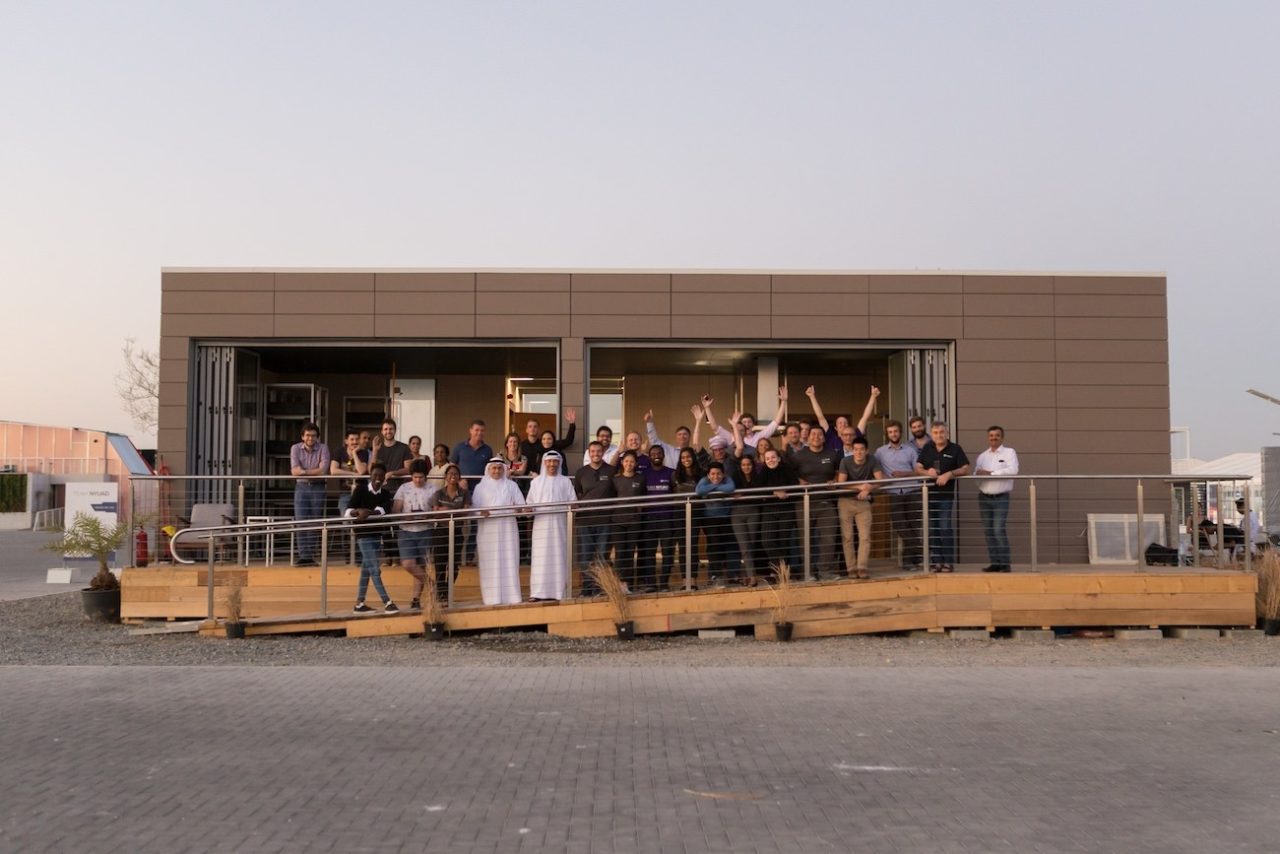And very soon we’ll finally be able to answer in the affirmative. The new business program, Business, Organizations, and Society, at NYU Abu Dhabi is in the final stages of accreditation. Of course, I had to get the first scoop on what the major entails and how it differs from a traditional Business major (as every program here seems to do). Most importantly, I had to learn all about the woman who will oversee the program, Professor Jemima Frimpong. I had the opportunity to sit down with her—over Zoom of course—and learn all about her past work, research, and her vision for an NYU Abu Dhabi Business major.
Professor Jemima Frimpong has a BS from Rutgers University, an MPH from the University of Arizona, and an MS and PhD from the University of Pennsylvania. She joined the NYU Abu Dhabi social sciences faculty in 2020. Her research focuses on the complex dynamics of decision-making and the intersection of information processing and discrimination.

So, first of all, tell me a little about what brought you to NYU Abu Dhabi.
Professor Frimpong: There are a few reasons. The opportunity to collaborate with faculty at NYU Abu Dhabi and across the global network was very attractive. Doing research in line with my program of research was also an important pull factor. These synergies and resulting interdisciplinary approaches were important to me. I also found the national diversity of the student body and the University’s approach to global liberal education attractive. The available resources—including those that directly support the newer decision-making stream of my research program—were another factor.
You’ve taught here for almost a year so far. The diversity of the student body is always something that both surprises and thrills our faculty. What’s been your experience so far?
Professor Frimpong: I’ve been in academia for quite some time and interacted with different student groups and populations, but there’s something very unique about NYU Abu Dhabi. I experience diversity in the classroom that I haven’t seen at other institutions. There is a richness of diversity that I believe positively informs the varying perspectives students bring to class discussions as well as their overall interpretation of course materials. The gender diversity in my class also delights me. Our individual as well as shared identities enrich how we experience the process of learning and knowledge gained from the classroom.
When students think about business, they don’t typically think about research. Can you tell me about the research you’re doing and how it came about?
Professor Frimpong: There is some truth to that statement. Often, but not always, students who pursue a Business major do not do so with research in mind. But I think this view changes once they learn that best practices in business and organizations are grounded in research. In the case of NYU Abu Dhabi, there is the Capstone Seminar and Project. The sequence gives students the knowledge and skills to conduct research on topics that are interesting to them. So, by design, research and having the space to implement a study are key aspects of an NYU Abu Dhabi degree. These research components are also an important part of the Business, Organizations, and Society major.
In terms of my own research, there are two main streams. Decision-making is at the center of each. Most of my research so far looks at how managerial attributes affect the adoption of innovative- and evidence-based practices. I am particularly interested in racial/ethnic and gender disparities in health-care organizations and how managerial decisions factor into that. A disproportionate percentage of the research aimed at addressing this issue focuses on the patient level.
We cannot underestimate patient characteristics. We know that a patient’s health insurance status, for example, is associated with health and health outcomes. But fewer studies ask questions about the organizations—and their employees—where patients seek care. My research focuses on these types of questions. This leads to interventions that can better position organizations to improve their performance, both at the patient and program levels.
Over time I began to think about new ways to investigate how managers process information. Also, how information processing influences their decision-making and how both of these factors lead to discrimination. I am particularly interested in the impact of biases (that is, stereotyping and prejudice) on managerial decision-making and behaviors (for example, hiring, evaluation of employees, and promotion). I use neuroimaging tools, such as a brain MRI, to understand decision-making. Studying a participant as they interact with a stimuli (like an applicant’s résumé) and makes decisions is one approach to understanding decision-making. This moves beyond what people tell you when you ask them about discrimination.
You can actually observe changes in brain activity that tell you something about the parts of the brain involved in how information about different job applicants are processed. That is, the parts of the brain activated when they make a decision. For example, you can discover differences in brain activation when a manager is reviewing the materials of a Black applicant, a white applicant, or an Asian applicant. The decision-maker may not be “aware” of how they process information about applicants. And they might not realize how this could lead to discrimination. That’s what’s interesting. That discrimination took place and has real implications is the important point. Regardless if the decision-maker is aware, it is necessary to intervene and eliminate such discriminatory behaviors.
That’s absolutely fascinating. How do you think NYU Abu Dhabi as an institution supports that kind of research?
Professor Frimpong: There are a number of resources here that support my program of research. The Core Technology Platforms is one. It provides equipment for brain imaging. A team of specialists, who collaborate with researchers on studies and help ensure the work being done in the labs is of the highest quality, also supports the brain imaging platform.
The Social Science Experimental Laboratory is another resource. The lab provides space and equipment that facilitate implementation of behavioral experiments and other studies. In addition, it has established relationships with organizations and the broader community and a participant pool that researchers can leverage. These are very important resources that can make a huge difference in the research process. As you mentioned earlier, I am fairly new to the NYU Abu Dhabi ecosystem. So I am sure there are other relevant resources across the University that I will encounter over time.
So what is the solution for biases in business and organizational leadership that we aren’t even aware of?
Professor Frimpong: In most cases, I would say it is less about unknown solutions. It is often about the effective implementation of evidence-based approaches that move us toward addressing and eliminating biases and discrimination. Potential solutions also have to be dynamic, operating at multiple levels.
In terms of biases in businesses and other organizational settings, mindfulness is one approach that I am especially interested in. For example, preliminary data from a study on hiring decisions and discrimination I conducted showed that there is a racial difference pattern to how managers inform decisions. At the onset of making hiring decisions about applicants who are equally valuable to an organization, white managers were more likely to hire white applicants, compared with Black applicants. However, after a certain number of decisions, we begin to see a shift, where they begin to hire Black applicants.
There are a number of ways one could interpret these preliminary findings. For example, it could be a learning effect, where managers later realize the pattern of racial differences in their hiring decision and try to correct it. Black managers, on the other hand, have a different pattern. They hire Black applicants at the beginning of their decision-making and maintain this pattern. What effects does the awareness of one’s biases and being intentional at the very beginning of decision-making have? This is one question that comes up for me. The mindfulness approach to decision-making, I believe, could have an important role inroads toward eliminating discrimination in hiring decisions. I hope to move the experiment paradigm used in the study and investigate the neural correlates of these potential biases and discrimination observed in the behavioral data.
This new major is really going to focus on how business and organizations interact with society. We’ve talked about racial and gender discrimination , which are huge topics in the business world today. What are some of the other connections between business and society that students can expect to dive into in this new major?
Professor Frimpong: The major’s location within an interdisciplinary division is one of its more unique aspects. The curriculum, in turn, highlights the social, political, and economic factors that have such important roles in organizations and society. Students will learn to analyze business decisions and outcomes from multiple lenses (social, political, economic), with an emphasis on the bidirectional role and responsibilities of business and organizations in society.
In addition, students will not only take courses that are informed by the multiple disciplines of the division, they will learn from faculty who spend a lot of time thinking about how dynamics in their fields influence some part of organizations and/or society. The major is also designed to give students a comprehensive perspective on the complex interactions between business, organizations, and society and how these institutions are truly reliant on each other. Not looking just at communities as people who receive impact but as individuals who benefit from and influence business as well is one way to think about that.
That relationship is key. Communities are integral to how businesses function and succeed, and businesses have an important role in sustainability. Whether social, political, economic, or cultural, students must have the tools to examine this bidirectional relationship in a meaningful way.
Preparing students with the foundational knowledge and skills for success in a variety of careers in private and public sector organizations is the major’s goal.
So we’ve established that this new program goes beyond a traditional Business major. Will it include the same quantitative and introductory coursework a student can expect to find in any other program?
Professor Frimpong: The foundational business courses are a key component of the major. When you look across NYU’s three degree-granting campuses, you will see the courses that constitute the foundational business core are similar. Students will certainly get the same types of “breadth” courses in subjects such as management and organization, strategic management, accounting, finance, marketing, business ethics, and leadership. Upon completion of the Business, Organizations, and Society major, students will be well positioned to demonstrate analytic competencies in core business disciplines and effective management through the development of decision-making, teamwork, leadership, and communication skills.
At NYU Abu Dhabi, part of our mission is to build global leaders. Would you say the essence of this major is to create more “mindful” global business leaders?
Professor Frimpong: Absolutely. Developing global leaders with more social awareness is one key tenet of the major. We want to give students the skills to effectively use data to drive their decision-making and the know-how when it comes to applying the global perspective that is essential to NYU Abu Dhabi. Students will develop tools and skills that facilitate their ability to think beyond their own perspectives, do so with innovation and creativity, and actually change and impact the way businesses and organizations operate within society. With these attributes, students will be well prepared to lead and thrive in business organizations. And they’ll do so with a global mindset.



